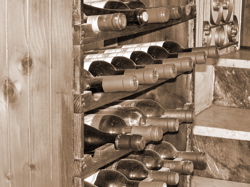|
|
All About Aging Wine
 Aging wine is something that many wine beginners are eager to get into but are often misguided about how to do so or which wines to age. The fact of the matter is that the large majority of wines in the world is made to be enjoyed young. Most wines, particularly everyday drinking wines (read "inexpensive"), are produced in a way that they are soft and supple when first released, without too much structure (acidity and tannins) that they can't be enjoyed young. If you hold them too long, even under ideal wine storage conditions, they will fade and loose interest relatively quickly. Therefore, not all wines should be aged. And when you do find a wine that will improve with bottle age, storing it correctly is critical. Aging wine is something that many wine beginners are eager to get into but are often misguided about how to do so or which wines to age. The fact of the matter is that the large majority of wines in the world is made to be enjoyed young. Most wines, particularly everyday drinking wines (read "inexpensive"), are produced in a way that they are soft and supple when first released, without too much structure (acidity and tannins) that they can't be enjoyed young. If you hold them too long, even under ideal wine storage conditions, they will fade and loose interest relatively quickly. Therefore, not all wines should be aged. And when you do find a wine that will improve with bottle age, storing it correctly is critical.
- What is the Point of Aging Wine?
Some wines start out life very structured, with high levels of acidity and/or tannins. They can also begin life fairly angular and simple, not showing the complexity and depth they have the potential for. Now in some cases this simply means it is a poor wine that will never be great. However, in some, aging wine will help to soften the wine, to round out the edges, to add complexity and generally bring the wine into harmony. Aging wine will not turn a bad wine into a good wine, in fact it often just makes it worse. What aging does is take a good wine that is suitable for aging and helps it reach its full potential, revealing more facets that were initially hidden and bringing the whole thing into harmony. This all sounds well and good but the aging curve of wine can be a hard thing to predict. Sometimes a wine with a lot of promise fails to improve in a wine cellar. Others may go through strange stages and if you open it at the wrong time you will have missed its peak window of drinkability and greatness. - What Happens As a Wine Ages
As a wine ages, in ideal conditions, the oxygen that is in the bottle slowly reacts with the chemical compounds in the wine. These reactions alter the compounds in the wine, including the aromatic and flavor components. In generally, this tends to lead to more aromatic and flavor complexity. It also tends to mellow the tannins so that a wine with bold tannins in its youth become softened and silkier. Ideally, as the wine rounds out and mellows, the wine starts to show better, filling out and becoming more lush and seductive. Wines can even seem to expand and grow with air and age into a lush mouthful of wine. After a certain point however, the age can start to become too much. The flavors and structure can start to fade and eventually you are left with a wine that is lifeless, dull and dead. The window in the aging curve can be over decades, or it can be relatively quick, depending on the type of wine and the specific wine in question. So it can be hard to predict how a wine will evolve in bottle in its youth. - Which Wines Age Well?
A general statement that you will hear about aging wine when first learning about wine is that bigger, more full-bodied wines age better than lighter ones and that reds age better than whites. In fact, these statements are very far from the truth. The most important wine characteristic for aging are balance. A wine should be balanced in its youth, with none of its different components sticking out. It should have good structure as well as good depth of fruit. If anything is far out of balance, aging tends to accentuate this fact. A wine that is excessively tannic in youth with little noticeable fruit will just get worse as its fruit fades and the tannins remain. This holds true to any wine, red or white and big or small. There are plenty of light-bodied white wines that age beautifully. Some lighter German Rieslings is one example. They tend to have the acid structure, intensity and balance to age gracefully for years. And there are some big red wines that do not age well at all. Some examples are big, fruit forward, jammy wines like some Zinfandels or Australian Shiraz. They are big and bold in youth, but with age they fade quick and loose their youthful vigor and personality.So determining which wines will age can be tricky. We suggest for starters that you base your initial picks historically. There are certain types of wines and wine producers who have historically made wines that improve well with age. For example, German Rieslings, Premier and Grand Cru red and white Burgundies, Bordeaux, California Cabernets, Italian Barolo and Barbaresco, Loire Valley Chenin Blancs like Savennieres and Vouvray, from good producers have a track record for aging well. Another thing to pay attention to is vintage. In many wine regions the style and characteristics of wine can vary dramatically from year to year. While one year may produce simple, lighter wines that are best for earlier consumption, another vintage may produce rich, balanced wines that require age to show their best. - How Do You Store Wine for Aging?
The absolutely most critical part of aging wine is proper wine storage! Any wine which is stored improperly will suffer from it and can even be rendered undrinkable! If you are going to invest in wines to cellar, make sure you have the means to do so correctly. In general, this means keep the wine in a cool, dark place at a relatively constant temperature (generally around 55° F) which does not vary considerably from day to night or from season to season. High temperatures can kill a wine very quickly! And chronic large temperature fluctuations can be bad as well. There are several options for storing aging wine, from a natural underground wine cellar to a free-standing wine cellar refrigeration unit to a wine storage facility. Any of these can be adequate for proper wine storage. For more information about storing wine for aging, see our Wine Storage page.
So aging wine is not a cure-all or a universal benefit for wines, it has a lot of dark corrodors, a lot of dead ends and the potential for much disappointment. So we recommend that you don't start buying wines to age until you know enough about the styles of wines, the specific producers and wines and have a good plan for storing your wine adequately to protect your investment. If all these things are paid attention to, aging wine can be a magical thing and watching the evolution of a great wine over years is very rewarding and fun. Good luck!
Done learning about Aging Wine?
Return to the Wine 101 page.

|
|
|




 Aging wine is something that many wine beginners are eager to get into but are often misguided about how to do so or which wines to age. The fact of the matter is that the large majority of wines in the world is made to be enjoyed young. Most wines, particularly everyday drinking wines (read "inexpensive"), are produced in a way that they are soft and supple when first released, without too much structure (acidity and tannins) that they can't be enjoyed young. If you hold them too long, even under ideal wine storage conditions, they will fade and loose interest relatively quickly. Therefore, not all wines should be aged. And when you do find a wine that will improve with bottle age, storing it correctly is critical.
Aging wine is something that many wine beginners are eager to get into but are often misguided about how to do so or which wines to age. The fact of the matter is that the large majority of wines in the world is made to be enjoyed young. Most wines, particularly everyday drinking wines (read "inexpensive"), are produced in a way that they are soft and supple when first released, without too much structure (acidity and tannins) that they can't be enjoyed young. If you hold them too long, even under ideal wine storage conditions, they will fade and loose interest relatively quickly. Therefore, not all wines should be aged. And when you do find a wine that will improve with bottle age, storing it correctly is critical.


